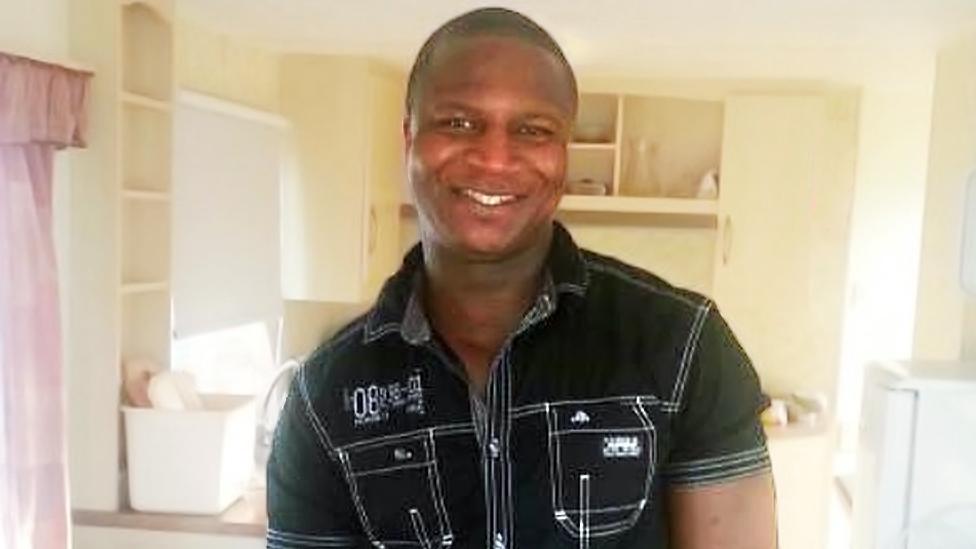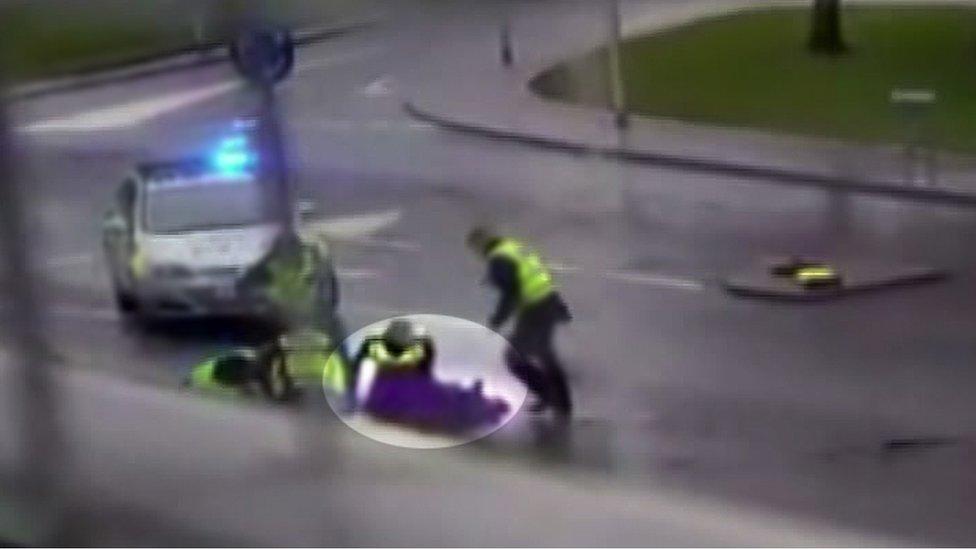Sheku Bayoh PC had shoe-like mark on vest, inquiry told
- Published

Sheku Bayoh died after being restrained by officers in Kirkcaldy in May 2015
A police federation official has described seeing what looked like "shoe marks" on a PC's uniform after she was allegedly assaulted by Sheku Bayoh.
The public inquiry into Mr Bayoh's death has heard that he struck PC Nicole Short on the head just before he was restrained by six officers.
Two officers claimed he stamped on PC Short as she lay on the ground.
But their account was disputed by a member of the public who watched the incident from his house.
Doctors found no injuries to suggest PC Short had been stamped on.
Scottish Police Federation official Amanda Givan told the inquiry she went to Kirkcaldy Police Station after the incident to look after the welfare of the officers involved.
PC Givan also said she wanted to make they were treated fairly by senior officers.
She told inquiry counsel Angela Grahame QC that the officers were "all really anxious" and "worried" as they sat in the canteen waiting for information.
In her statement to the inquiry, PC Givan also said she saw what "looked like a dirty mark" on PC Short's hi-vis vest, which she had been wearing over her body armour.
"If I'm being asked to speculate, it looked like it was roughly the shape of a shoe mark," the statement said.

Mobile phone image of police restraining Sheku Bayoh
"Albeit you couldn't see specific tread detail, but it looked to be roughly the size and shape. It was a kind of long, thin mark, roughly the shape of a shoe."
She added: "I made the presumption that perhaps it had been caused when she was injured, and that she had perhaps been kicked or stood on."
The inquiry heard that PC Givan disputes a senior officer's account of what the officers were told in the hours after Mr Bayoh died.
She had advised them not to give statements about the incident until they were informed whether they were being treated as suspects or witnesses.
"Until they tell you you're a witness, they shouldn't be asking you for a statement," she said.
Former Det Supt Pat Campbell has told the inquiry he entered the canteen that morning and explained to the officers that their status was that of a witness.
Diversity training
PC Givan insisted this was not said at the time.
She said that when the officers' clothing was seized later that day, some of them believed they were being treated as suspects.
It was June 2015 before their status as witnesses was confirmed.
Asked about the difference between Mr Campbell's recollection and her own, she replied: "All that was required was confirmation whether people were witnesses or suspects.
"If that was so easy, why weren't the officers told? I can't explain why he's saying that that happened."
Within a few days of the incident, most of the officers met again at the police station.
PC Givan said they were informed that the post-mortem examination on Mr Bayoh had been completed.
The meeting also allowed senior staff to check on the welfare of those involved.
She was asked about the diversity training she had, both before and after the incident, and the racial composition of both Police Scotland and the federation.
'We are not all treated equally'
PC Givan was also asked if she had ever heard racism within the police.
She said she had not, and told the inquiry she would challenge racist language or jokes from officers if she heard it.
"I joined the police in 1992, I am very aware that we are not all treated equally," she said.
"I wouldn't sit back and not challenge something I believe is wrong or is racist, or homophobic, or sexist, I would absolutely speak my mind."
PC Givan earlier told the inquiry PC Short appeared to have discomfort in her upper body after the incident.
"When Nicole arrived back, my recollection is that if she was going to speak to someone she entirely moved her body from her waist," she said.
"She didn't turn her head, she turned her entire body."
She said PC short appeared to be avoiding moving her neck.
The inquiry continues.